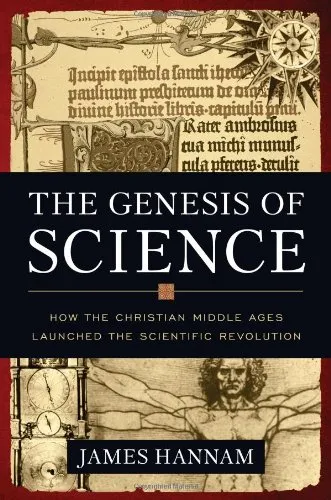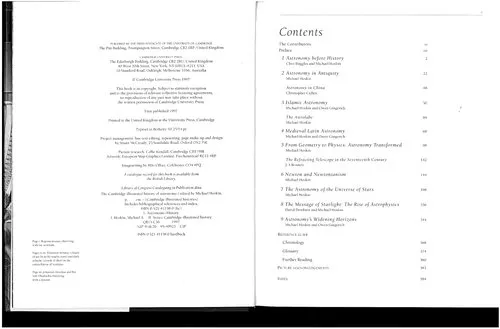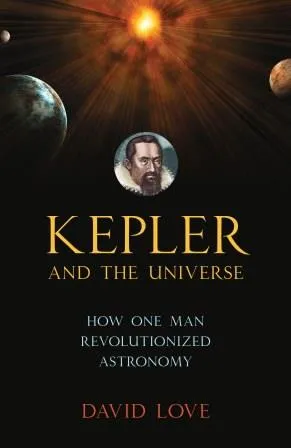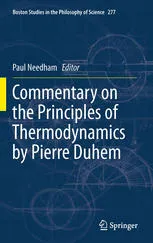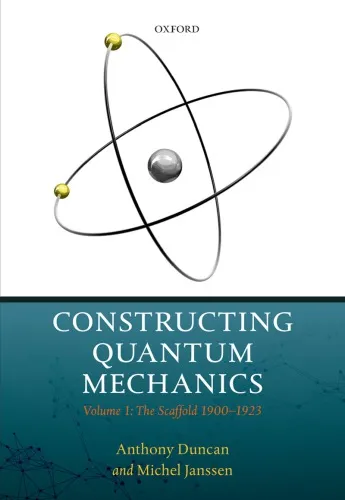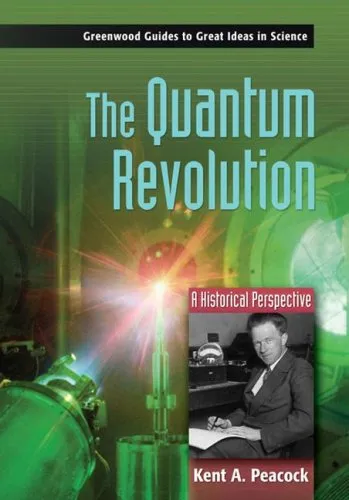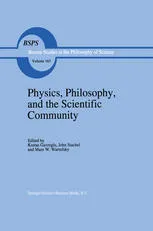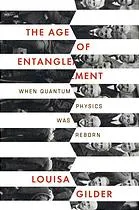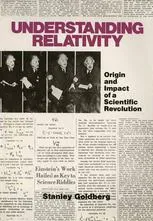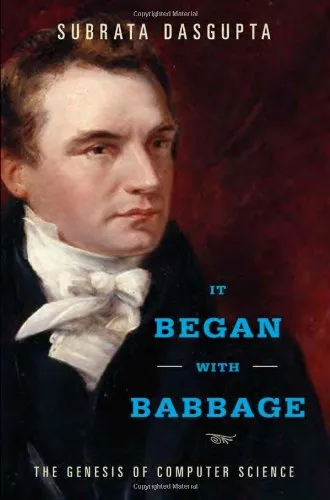The Genesis of Science: How the Christian Middle Ages Launched the Scientific Revolution
4.5
بر اساس نظر کاربران

شما میتونید سوالاتتون در باره کتاب رو از هوش مصنوعیش بعد از ورود بپرسید
هر دانلود یا پرسش از هوش مصنوعی 2 امتیاز لازم دارد، برای بدست آوردن امتیاز رایگان، به صفحه ی راهنمای امتیازات سر بزنید و یک سری کار ارزشمند انجام بدینکتاب های مرتبط:
معرفی کتاب «The Genesis of Science: How the Christian Middle Ages Launched the Scientific Revolution»
کتاب «The Genesis of Science» اثر من، جیمز هَنَم، یکی از مهمترین کتب در حوزه تاریخ علم است که تلاش دارد باورهای اشتباه پیرامون دوران قرون وسطی و نقش آن در شکلگیری انقلاب علمی را تصحیح کند. این کتاب با استفاده از تحقیقات جامع و استناد به منابع تاریخی معتبر، نشان میدهد که چگونه دوران مسیحی قرون وسطی بهجای عصر تاریکی، بستر مهمی برای شکلگیری پیشرفتهای علمی بوده است.
خلاصه جامع کتاب
کتاب در شش بخش اصلی تنظیم شده است که هر یک به بررسی جنبهای کلیدی از رابطه میان علم و دوران مسیحی قرون وسطی پرداختهاند. برخلاف عقیدهی رایج که قرون وسطی را دورهای خرافی و عقبافتاده میداند، این کتاب به این نکته اشاره دارد که افراد برجستهای همچون Roger Bacon و Thomas Aquinas پایههای بسیاری از علوم مدرن را بنا نهادند. همچنین مفاهیمی مانند محاسبات ریاضی، مکانیک حرکتی و Astronomy که در آن دوران توسعه یافتند، زمینه را برای انقلاب علمی قرن هفدهم مهیا کردند. در طول این اثر، از ایدههای اصلی علوم مکانیکی، پیشرفت در محاسبات، و دستاوردهای فرهنگی همچون دانشگاهها سخن به میان آمده است.
این کتاب همچنین بر این موضوع تاکید دارد که کلیسای کاتولیک نه تنها مانعی برای علم نبوده بلکه، در بسیاری موارد، از توسعه علمی حمایت کرده است. این موضوع به ویژه در دانشگاههای قرون وسطایی که اکثر آنها تحت مدیریت کلیسا فعالیت میکردند، بهخوبی نمایان است. به همین دلیل، قرون وسطی را میتوان خاستگاه مفهوم "تلاش عقلانی برای درک جهان" دانست که هسته اصلی علم مدرن محسوب میشود.
نکات کلیدی از کتاب
- اعتقاد مرسوم به اینکه کلیسا مانع علم بوده است، چالش برانگیز و تا حد زیادی اشتباه است.
- قرون وسطی زمینهساز بسیاری از ایدههای علمی بود که بعدها تکامل یافتند.
- توسعه Algebra، Astronomy و حتی اصول اولیه Physics در این دوره آغاز شده است.
- Universityها، که توسط کلیساهای مسیحی پایهگذاری شدند، پلتفرمهای بحث و تبادل نظر علمی ایجاد کردند.
- ارزش واقعی انقلاب علمی تنها با درک پیشرفتهای پیشین در قرون وسطی مشخص میشود.
جملات معروف از کتاب
“Far from being a period of stagnation, the Middle Ages laid the intellectual and institutional foundations for the Scientific Revolution.”
“The Church was not an obstacle to science; it was the cradle of it.”
چرا این کتاب مهم است؟
کتاب «The Genesis of Science» یک پاسخ قوی به این تصور غلط تاریخی است که علم مدرن صرفاً با کنار گذاشتن باورهای مذهبی دوران پیشین به پیشرفت رسید. این اثر نشان میدهد که چگونه اندیشهورزی فلسفی و مذهبی در قرون وسطی، پایههای بسیاری از مفاهیم علمی را ایجاد کرد که به کشفهای بزرگی در دوران انقلاب علمی منجر شد. همچنین، این کتاب برای کسانی که علاقهمند به شناخت ارتباط میان علم، مذهب و تاریخ هستند، یک مرجع ارزشمند محسوب میشود.
اگرچه بسیاری از روایتهای تاریخی، قرون وسطی را به اشتباه «عصر تاریکی» مینامند، این کتاب با شواهد مستند تاریخی نشان میدهد که قرون وسطی نه تنها تاریک نبود، بلکه در بسیاری از موارد روشنگرانه و انقلابی بوده است. این اثر نهتنها برای پژوهشگران علمی و تاریخی، بلکه برای هر فردی که به حقیقت تاریخی و علمی اهمیت میدهد، میتواند جذاب و آموزنده باشد.
Introduction to 'The Genesis of Science: How the Christian Middle Ages Launched the Scientific Revolution'
'The Genesis of Science: How the Christian Middle Ages Launched the Scientific Revolution' is a groundbreaking work by James Hannam that delves into one of the most misunderstood and maligned periods of history: the Middle Ages. Often dismissed as a time of intellectual stagnation, this book challenges the conventional perception of the medieval era, revealing it as a fertile ground for intellectual innovation and scientific progress. By examining key figures, ideas, and advancements of the time, Hannam demonstrates how the Christian Middle Ages laid the essential groundwork for the scientific revolution.
Detailed Summary of the Book
'The Genesis of Science' takes readers on an enlightening journey through the medieval period, focusing on the contributions of scholars, theologians, and natural philosophers who shaped the course of intellectual history. Far from being "the Dark Ages," the Middle Ages saw significant strides in fields such as mathematics, astronomy, medicine, and mechanics. The author explores the work of visionaries such as Robert Grosseteste, Albertus Magnus, Thomas Aquinas, and Roger Bacon, showing that their curiosity and faith in a rational, orderly universe were instrumental in the development of science.
The book also addresses some of the myths about medieval science, such as the belief that the Church suppressed scientific inquiry. Hannam argues that the medieval Church was, in fact, a patron of education and intellectual exploration, establishing universities and supporting scholars. By the time the Renaissance and Enlightenment arose, the seeds of scientific reasoning had already been sown, thanks to centuries of diligent work by medieval thinkers.
With a rich narrative and careful scholarship, 'The Genesis of Science' not only restores the reputation of the Middle Ages but also connects this era to the achievements of the scientific revolution. Hannam’s engaging prose ensures that complex ideas are accessible, while his passion for the subject captivates readers who might otherwise overlook this pivotal historical period.
Key Takeaways
- The Middle Ages were not an intellectual vacuum but a period of substantial scientific, mathematical, and philosophical development.
- The work of medieval scholars directly paved the way for later scientific breakthroughs during the Renaissance and beyond.
- Many misconceptions about the Church's role in science are debunked, highlighting its critical role in fostering education and inquiry.
- The assumption of a rational, law-governed universe, stemming from medieval Christian theology, was essential for the birth of modern science.
Famous Quotes from the Book
"The Middle Ages were, in fact, a period of significant advancement in human understanding and a vital stage in the history of science."
"The medieval Church, far from being an enemy of learning, was a major sponsor of education and inquiry."
Why This Book Matters
'The Genesis of Science' is more than just a historical account; it is a powerful corrective to centuries of misunderstanding about the Middle Ages. By highlighting the intellectual achievements of this era, the book challenges modern readers to rethink the simplistic narratives they may have encountered in popular culture or outdated textbooks. Moreover, it underscores the importance of collaboration between faith and reason, showcasing how theological conviction and scientific curiosity can coexist and even complement one another.
In an age of growing interest in the history and philosophy of science, this book stands out as a vital contribution to a nuanced understanding of how we arrived at the modern scientific worldview. It is essential reading for anyone interested in history, science, or religion, providing a fresh perspective on a critical era that still influences our world today.
دانلود رایگان مستقیم
شما میتونید سوالاتتون در باره کتاب رو از هوش مصنوعیش بعد از ورود بپرسید
دسترسی به کتابها از طریق پلتفرمهای قانونی و کتابخانههای عمومی نه تنها از حقوق نویسندگان و ناشران حمایت میکند، بلکه به پایداری فرهنگ کتابخوانی نیز کمک میرساند. پیش از دانلود، لحظهای به بررسی این گزینهها فکر کنید.
این کتاب رو در پلتفرم های دیگه ببینید
WorldCat به شما کمک میکنه تا کتاب ها رو در کتابخانه های سراسر دنیا پیدا کنید
امتیازها، نظرات تخصصی و صحبت ها درباره کتاب را در Goodreads ببینید
کتابهای کمیاب یا دست دوم را در AbeBooks پیدا کنید و بخرید
1387
بازدید4.5
امتیاز0
نظر98%
رضایتنظرات:
4.5
بر اساس 0 نظر کاربران
Questions & Answers
Ask questions about this book or help others by answering
No questions yet. Be the first to ask!
